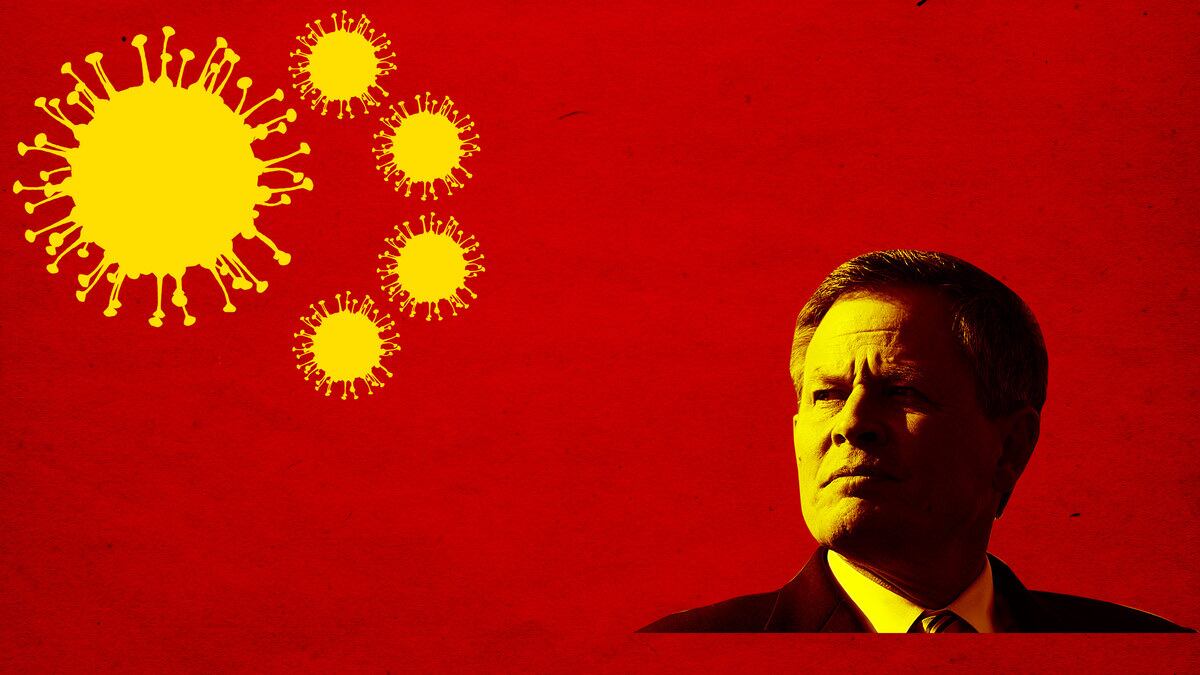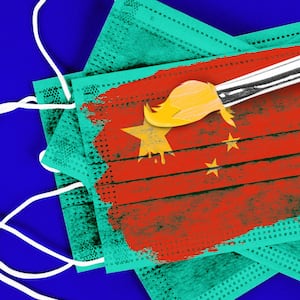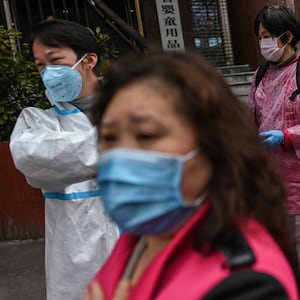In mid-April, national Republicans urged their Senate candidates to focus their coronavirus messaging on Chinese misdeeds. The day before, Sen. Steve Daines (R-MT) had already started buying television ads doing just that.
Daines’ campaign moved on April 16 to reserve TV ad time for a 30-second spot that alleged, in the words of campaign filings with the Federal Communications Commission: “China is responsible for the coronavirus and needs to be held accountable.”
The TV buy followed weeks of digital advertising by the campaign hitting the same message, and efforts by Daines in his official capacity to investigate and punish Beijing for what U.S. officials believe was an effort to downplay the virus publicly while China secured resources to combat it internally.
ADVERTISEMENT
The Daines ad campaign is standard fare for Trump-allied Republicans these days. But unlike many of his Senate colleagues, Daines is criticizing China after years of feting high-ranking officials in its government, most recently as a senator whom the country’s top diplomat in the U.S. praised as a steadfast ally. Years earlier, Daines worked in China for a Fortune 100 company that worked closely with local Communist Party officials to market and distribute its products.
Daines’ office did not respond to requests for comment on this story.
The contrast between Daines’ tone since last month and his work in the years prior shows the challenges that some lawmakers will face as they attempt to lean into anti-China messaging in the absence of a more coherent, positive list of coronavirus-related accomplishments that they can sell to voters in an election year.
That’s a challenge faced to a certain degree by President Trump himself, who, along with his campaign and the Republican National Committee, has teed off on China in recent weeks over its role in the virus’ early spread. Though a frequent China critic even prior to his foray into politics, Trump has lavished praise on his “friend,” Chinese president Xi Jinping. And in the early weeks of the coronavirus outbreak, Trump repeatedly praised Xi’s government’s response to the pandemic.
Daines too had some kind words for the early Chinese response to the coronavirus. “The Chinese government aggressively worked to contain it,” he said during a February 25 interview on the Fox Business Network.
“I think the challenge we face right now though,” he added, “is we’re not always getting perhaps transparency and accuracy from what is actually happening in China, so that’s one of the challenges we face is are the numbers even accurate? Are they understating what’s really happening in China?”
Daines’ position now is that not only was Chinese data inaccurate, but that the Communist Party deliberately covered up the true nature of the virus, and must now be punished for it.
“China lied about the Coronavirus, putting the jobs and health of Montanans at risk,” he alleged in the campaign ad that began airing last month. “Now America is dangerously dependent on China for life saving drugs. Senator Steve Daines is holding China accountable.”
The Facebook ads run by Daines campaign since early April made similar allegations. “The Chinese Communist Party suppressed information, downplayed the virus, arrested doctors who tried to warn the public, and even tried to blame American soldiers for creating the China virus. Their actions are reprehensible. Help me EXPOSE China's deadly cover-up of the China virus,” one such ad said.
That language closely mirrored talking points circulated to Republican Senate campaigns by the National Republican Senatorial Committee in a memo dated April 17.
“The Chinese Communist Party caused this pandemic. They arrested doctors who tried to warn us. They covered up the number of deaths. They lied and pretended the disease could not be transmitted. China bought up the world’s supply of face masks and medical supplies, and then stopped exports out of the country when we needed them,” the memo, which was first reported by Politico, said.
That memo also advised Senate candidates to pledge to “move our manufacturing out of China and back home” so as to “create jobs in the United States” and benefit national security. “We need to get all of our pharmaceutical production out of China because we can’t trust them,” it added. That language tracked with Daines ads on Facebook that hailed his efforts at “Breaking our dependence on China. Bringing drug manufacturing jobs back to the U.S. Speeding up the development of Coronavirus vaccines.”
“Finally,” the NRSC memo advised candidates to say, “we need to investigate how China was able to keep this pandemic hidden. China should pay a price for arresting doctors who tried to warn about the pandemic.” That’s precisely what Daines has done in his official capacity. In early April, he officially requested a State Department investigation into China’s “culpability” in the coronavirus pandemic.
Daines is just one of a number of U.S. lawmakers who’ve pressed for that sort of inquiry. But he has a lengthier track record than most of not just working with the Chinese government but actively courting senior Communist Party officials. “Some people tend to see China as a binary choice, between a friend or a foe, but in reality you can’t put China into some kind of well-defined box,” said Daines, then the co-chair of the the Senate US-China Working Group, during a 2017 keynote address at an annual gala for the US-China Business Council.
Much of that work took place as Daines sought to open up Chinese markets to U.S. exporters—in particular Montana’s beef industry. In 2017, Daines succeeded in winning a $200 million deal for the sale of Montana livestock in the country. In August of last year, he announced his fifth trip to China as a U.S. Senator.
During one of those delegations, Daines sought to reassure Chinese government officials concerned about Trump administration efforts to boost U.S. relations with Taiwan, which Beijing considers a breakaway province of China. “We only have one embassy in China, here in Beijing, and one ambassador who is sitting right next to me,” Daines assured his hosts in his June 2018 trip, according to a Financial Times report on the meeting.
Daines has also welcomed high-ranking Chinese government officials to the U.S. in his official capacity. In December 2017, shortly after winning that Chinese beef export deal, Daines hosted a delegation of party officials who oversee the disputed territory of Tibet. The event was timed to undermine a simultaneous visit to Washington by the leader of Tibet’s government-in-exile.
Daines also opposed a Senate resolution earlier that year to rename the street outside of the Chinese embassy in Washington after an imprisoned Chinese dissident. A spokesperson told the Washington Post at the time that Daines was "focus[ed] is on making change with tact and wisdom, not flashy headlines."
A former senior U.S. official who was deeply involved in policy towards China told The Daily Beast that Daines’ accommodations of Chinese officials and priorities, even in the context of his efforts to open up markets to Montana exporters, went beyond the normal give-and-take generally required to win concessions from that government.
“If you want to choose to engage you have to do so in a balanced way so your constituents don't feel that you’re capitulating to every whim in order to get access,” the official said. “What you see in Sen. Daines is an imbalance at a minimum and overtures that are beyond what you see from any other member.”
“You’re allowed to want bilateral trade,” the official added. “You just aren’t allowed to bend over backwards to do it and then claim you’ve been tough on China.”
Daines’ work with the Chinese government even earned him plaudits from senior Party officials. Cui TianKai, China’s ambassador to the U.S., lavished praise on Daines during an event in Montana in 2017 promoting the state’s livestock industry, according to a Bozeman Daily Chronicle report.
“TianKi hailed Daines, and called him China’s ambassador in Congress,” the paper reported. “Daines said the friendship with China is greatly appreciated.”
The senator’s work in China goes back to the 1990s, when he worked for consumer goods giant Procter & Gamble. Daines lived for years in Hong Kong and mainland China, where he helped expand the company’s business in the country and ran one of its manufacturing plants. At the time, P&G was pioneering the use of Communist Party “neighborhood committees” as local sales and distribution networks to try to elbow its way into Chinese markets.
Daines’ time in China for P&G featured prominently in his early commentary on the coronavirus. He mentioned his years there during his Fox Business interview in late February, and in a local talk radio interview a couple weeks earlier.
That résumé item went unmentioned in the early April radio segment in which he announced his efforts to investigate China’s coronavirus conduct.








